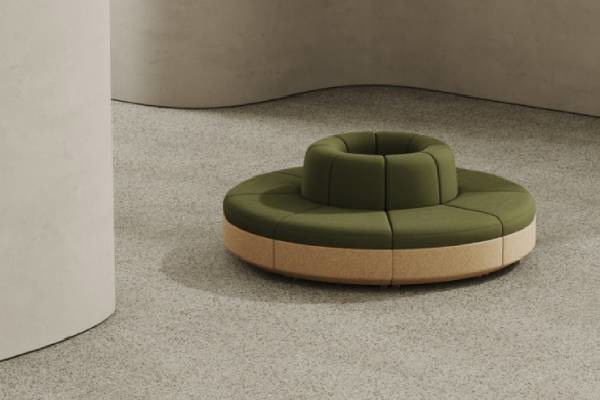Sustainably made by recycling cork waste from the production of wine stoppers, Isomi's recyclable Tejo sofa system offers elegance, comfort, and versatility; helps preserve Portugal's cork forests; and marks a major step towards the circular economy.
Of all the categories of furniture, the sofa is probably the most challenging in terms of sustainability. Structurally complex and non-transparent in their material components, sofas are typically formed from gluing or stapling polyurethane foams and fabrics to plywood or steel frames, making them difficult or almost impossible to separate into their constituent materials for recycling. At the end of their useful lives, most sofas are consigned to landfill.
For award-winning modular furniture specialist Isomi, the decision to introduce an entirely new furniture typology to its portfolio in the form of a sofa was not taken lightly. Not wanting to add another unnecessary conventional sofa concept to the market, Isomi design director Paul Crofts set out to develop a sofa system that was constructed as sustainably as possible, using natural resources.

Sustainably made by recycling cork waste from the production of wine stoppers, Isomi's recyclable Tejo sofa system offers elegance, comfort, and versatility; helps preserve Portugal's cork forests; and marks a major step towards the circular economy.
The principal material in Tejo is cork – a first for Isomi. Always eager to explore new materials and processes, Paul Crofts had been looking to use cork in an Isomi design for several years – a sofa provided the perfect opportunity. Grown in responsibly managed forests in the Portuguese region of Alentejo – which gives the sofa its name – cork is ideal for use in seating as it is not only soft, tactile, and visually beautiful, it also regenerates naturally.
A protected species and an important contributor to the region's biodiversity, Alentejo's cork trees take 25 years to grow to maturity, after which their bark can be harvested every nine years for the full lifespan of the tree – often over 200 years or more.
More information:
Isomi
[email protected]
www.isomi.com










